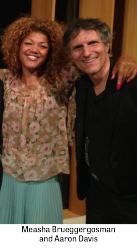 It was a dark and snowy afternoon Wednesday, November 19, 2014. The first significant snowfall of the year blanketed the city sidewalks and the air was decidedly crisp. I subwayed to Hugh’s Room on Dundas West for the launch of Toronto diva Measha Brueggergosman’s new album Christmas (Warner Music Canada) and its 19-date Canadian tour. It was a treat to witness the New Brunswick native, so at home in concert recitals and opera, in such an intimate dinner club concert setting. Though only in her 30s, she is that rare breed today: Canadian classical music royalty. Brueggergosman is a glittering diva combining superb vocal and acting chops, a bona fide classical celebrity in a country where the two words don’t usually crop up in the same sentence.
It was a dark and snowy afternoon Wednesday, November 19, 2014. The first significant snowfall of the year blanketed the city sidewalks and the air was decidedly crisp. I subwayed to Hugh’s Room on Dundas West for the launch of Toronto diva Measha Brueggergosman’s new album Christmas (Warner Music Canada) and its 19-date Canadian tour. It was a treat to witness the New Brunswick native, so at home in concert recitals and opera, in such an intimate dinner club concert setting. Though only in her 30s, she is that rare breed today: Canadian classical music royalty. Brueggergosman is a glittering diva combining superb vocal and acting chops, a bona fide classical celebrity in a country where the two words don’t usually crop up in the same sentence.
As thrilling as it was to witness the Grammy-nominated, JUNO-winning star deftly working the music – and her fans in the room – I was primarily there to see the singer’s musical director, arranger and pianist Aaron Davis at work. But first, full disclosure: my path crossed Davis’ at York University’s Music Department back in the mid-1970s. He was deeply immersed in jazz then and I in everything but. We did however share some common ground in the study of the music of several West African, Caribbean, and South Asian cultures.
The next morning I spoke to Davis over the phone. This wasn’t meant as throwback Thursday nostalgia, but rather to ask about elements of the “world” in his subsequent music career.
What do I mean? The closer I listened to and considered Davis’ music, the more parts of it appeared to be a case study of one vector by which musical features found originally outside the North American vernacular mainstream can enter its commercial core. I wanted to know how rhythms, grooves, feels, modal tonalities and timbres from four decades of world music exploration have inspired and penetrated his prolific and successful band-leading, composing and arranging career. (An example: his scores for more than 100 films have garnered three Genie award nominations and four Gemini awards.)
“In 1979 I co-founded the Toronto world beat-jazz band Manteca, for which I wrote music and played keyboards,” Davis began “In 1981 I formed my own band and a year later released the album, Nouvelle Afrique.” The LP, while rich with musicians with solid jazz cred like Toronto saxophonists John Johnson, Alex Dean, Ron Allen, and drummer Mike Sloski, also features the South African singer Vusi Mahlasela on the Davis song “Mandela.” Another track “Calypso Dumpling” has Caribbean affiliations.
Davis is perhaps still best known as the long-time pianist and arranger for jazz singer Holly Cole, with whom he formed a trio along with bassist David Piltch in 1986. “Measha Brueggergosman grew up listening to the Holly Cole Trio and around 2006 asked me to work with her,” recalls Davis. Then two years ago “when we were at Banff, Measha said ‘let’s make the Christmas album we always wanted to make.’ I’d already produced two different Christmas [jazz] albums with Holly,” so it felt like a natural progression.
But what features of world music – Davis is comfortable with the term – are embedded in his Christmas song arrangements? He went through the set list from the night before, much of it from the new Chrismas album. “I arranged ‘Do You Hear What I Hear’ with a contemporary guitar-based folk feel, [but spiced it up] with a Bollywood-style mixolydian modal unison string interlude. On the other hand I gave an Afro-beat treatment to ‘Afrosonic/I Could Have Danced All Night.’ ‘The Most Wonderful Time of the Year’ got a pop arrangement with a gospel breakdown in the middle, and I use several African American genres including 1970s funk in ‘Sleigh Ride’ and ‘If You Can Dig It.’ Yet jazz, in ‘Wade in the Water’ and ‘Our Love is Here to Stay’ is also certainly very present in these arrangements.”
Among the most exciting arrangements is ‘The Christmas Song’ (a.k.a. ‘Chestnuts Roasting’). It “is set in a gentle 12/8 African metric grid, like those I first came across at a 70s Ghanaian music workshop at York U., but counterpointed with a repeated descending, gapped melodic motif imitating a European church bell.” Davis pointed out his intentional transcultural gesture, superimposing the church bell motif onto the West African bell rhythm the shaker is playing in his setting.
Measha Brueggergosman’s tour of Christmas, with Aaron Davis directing his worldly arrangements from the keyboards, continues its way across Canada through the month, wrapping on December 20 in St. John’s, NL.
Andrew Timar is a Toronto musician and music writer, and frequent contributor to The WholeNote. His regular World View column may be found here.



